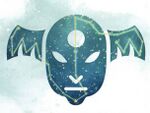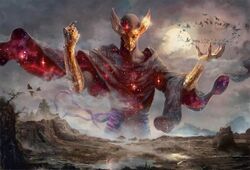Phenax
| Phenax | |
|---|---|
| God of Deception | |
| Information | |
| Colors |
|
| Species | God |
| Birth, Life & Death | |
| Birthplace | Theros |

Phenax (/fiːnɑks/, FEE-nahks[1]) is the God of Deception on Theros. He governs gambling, lies, betrayal, and secrets, and is associated with blue and black mana. Phenax is also the first of the Returned, the undead who have escaped the Underworld, and as such, he is seen as their progenitor and patron. He is usually depicted wearing a golden funerary mask and armor on his hands and arms, remnants of his death and return. His followers include criminals, gamblers, and those who seek to undermine order and manipulate others.
Description
Phenax is the god of cheats, liars, and betrayal. He governs deception, isolation, and the manipulation of fate, making him a figure of cunning and subtlety. As the first mortal to escape the Underworld, Phenax learned to forsake his identity to avoid detection by Erebos and crossed back to the living world wrapped in the tattered cloak of Athreos, the River Guide.[2][3] His ability to cheat death is central to his divine identity and the origin of the Returned.
Phenax is a consummate actor, able to adopt any guise needed to further his schemes. When appearing to mortals, he often takes the form of a willowy humanoid with ashen gray skin, dressed in elegant robes. He may also appear as various animals, including asps, mockingbirds, or rats. His face is always concealed by a golden funerary mask, symbolizing his status as the first Returned and a god of secrets.
His influence extends to manipulation of thought, word, and deed, and he delights in corrupting champions of law and order by tempting them into small compromises that eventually lead to their moral downfall. Phenax respects well-planned deception and often rewards clever followers who serve as his agents in the mortal world.
Influence and Goals
Phenax’s power lies in manipulation and subversion. He uses lies, secrets, and betrayal to undermine the plans of other gods and mortals alike. He enjoys corrupting champions of order, such as followers of Heliod and Iroas by tempting them into small ethical compromises that eventually lead to their downfall. His influence is strongest in places like gambling halls, dens of thieves, and among those who operate outside the law.
Phenax does not seek to rule the divine realm but instead exists to disrupt and challenge the status quo. He finds particular satisfaction in chaos and disorder and respects clever plans and cons. Phenax also serves as protector and patron of the Returned, providing shelter and opportunities for them to disrupt the mortal world.
Divine Relationships
Phenax’s relationships with other gods are strained and marked by distrust. Erebos and Athreos, gods of death and the Underworld, despise Phenax for cheating death and escaping their grasp, and they constantly seek ways to punish him.[3] Phenax enjoys antagonizing them in return.
He holds Heliod and Iroas in contempt because their ideals of law, justice, and order directly oppose his values. Their followers often seek to thwart his schemes, making them natural enemies.
Phenax’s role in aiding the rise of Xenagos, the now-destroyed god of revels, further highlights his desire to upset the divine order. He covertly supported Xenagos's apotheosis, viewing the mortal’s ascension as a profound subversion of authority.
Worship
Phenax’s worshippers are mostly criminals, gamblers, and others who rely on deceit and trickery. His influence is felt strongly in gambling halls and thieves’ dens, but many mortals seek his favor in small ways by telling lies or bending the truth in their daily lives.
Formal worship is conducted primarily at night, with sacred rituals taking place on new moon nights. Offerings often include stolen valuables, parchments filled with lies, or loaded dice, which are thrown into deep crags or buried at crossroads. These offerings frequently disappear soon after, believed to be claimed by Phenax or his servants.
Phenax is openly worshiped in the necropolis of Asphodel and Odunos, where somber ceremonies are held to bless the golden funerary masks worn by the Returned. However, Returned loyal to Erebos’s agent, Tymaret, refuse to acknowledge Phenax's godhood and thus avoid worshiping him.[3]
History
Phenax's Secret
Phenax's forgotten past as a mortal hides a secret which Erebos conspires to bury. According to a tale few dare whisper, Phenax was destined to free the Titans from the Underworld — a future so calamitous that mortals killed him to avert it, and the gods later allowed his escape to protect themselves. What he might do upon learning this truth is a question that even the Fates leave unanswered. After escaping the Underworld, Phenax is said to have hidden on a crumbling island palace at the edge of the world, where the Tartyx spills into the unknown. The ruler of this forsaken ruin is none other than Phenax's own eidolon — his discarded identity, still alive with forgotten knowledge. Other buried truths stalk him: offspring triplets, abandoned in the Underworld after their death and held captive by Erebos as leverage; and distant descendants living among mortals as master thieves, some said to possess the cunning and audacity to steal godhood itself. The secret to Phenax's immortality, flawed and fraying, lies within the Underworld and is accessible only to those who have died, returned to life, and journeyed back to the Underworld once more. Legends speak of one such being — a Returned with the power to claim this secret and ascend, or perhaps even to renew Phenax's fading divinity for another age. The veracity of any or all of these stories is uncertain.[3]
Underworld
Originally a mortal trapped in the Underworld, Phenax managed to hide from the watchful eyes of Erebos and Athreos by forsaking his identity and crossing back to the living wrapped in Athreos’s cloak. This escape established his role as the first Returned and set him on the path to godhood.
Cooperation with Ashiok
In the Theros block story arc, Phenax made a pact with the nightmare planeswalker Ashiok. He agreed to help Ashiok lay waste to the polis of Iretis to create a new home for the Returned in exchange for making Ashiok invisible to the other gods, allowing the planeswalker to operate undetected. Phenax found amusement in Ashiok's plans.[4]
Silence of the Gods
Like the other gods of Theros, Phenax was affected by the Silence of the Gods, which prevented him from influencing mortal affairs during that period.[5]
It is also strongly implied that Phenax was the god behind the curse in "The Consequences of Attraction," which transformed Xandria into a siren after falling in love with Ninis, a mortal Phenax himself had taken an interest in.[6]
Inspiration
The character of Phenax is inspired by Hermes, Greek god of thieves, travelers, and border crossings, guide to the Underworld; Dolos, son of Erebus, spirit of trickery and guile; and Atë, the personified spirit of mischief, delusion, ruin, and folly. The name is likely from the Ancient Greek word φέναξ (phénax), meaning cheat, quack, or impostor.
Gallery
Story appearances
In-game references
- Represented in:
- Associated cards:
- Depicted in:
- Quoted or referred to:
References
- ↑ Wizards of the Coast (September 26, 2013). "Theran Pronunciation Quiz". magicthegathering.com. Wizards of the Coast. Archived from the original on 2021-04-30.
- ↑ Flavor text for Minion's Return
- ↑ a b c d Wizards RPG Team (2020), D&D Mythic Odysseys of Theros, Wizards of the Coast
- ↑ Ken Troop (April 23, 2014). "Dreams of the City". magicthegathering.com. Wizards of the Coast.
- ↑ Jenna Helland (April 2014). "Theros: Godsend, Part I." Wizards of the Coast. ISBN 978-0-7869-6556-4.
- ↑ Ken Troop (October 9, 2013). "The Consequences of Attraction". magicthegathering.com. Wizards of the Coast. Archived from the original on 2021-02-16.
External links
- The Magic Creative Team (January 29, 2014). "The Gods of Born of the Gods". magicthegathering.com. Wizards of the Coast.
- Mike McArtor (March 24, 2014). "Born's Gods". magicthegathering.com. Wizards of the Coast. Archived from the original on 2021-04-29.

